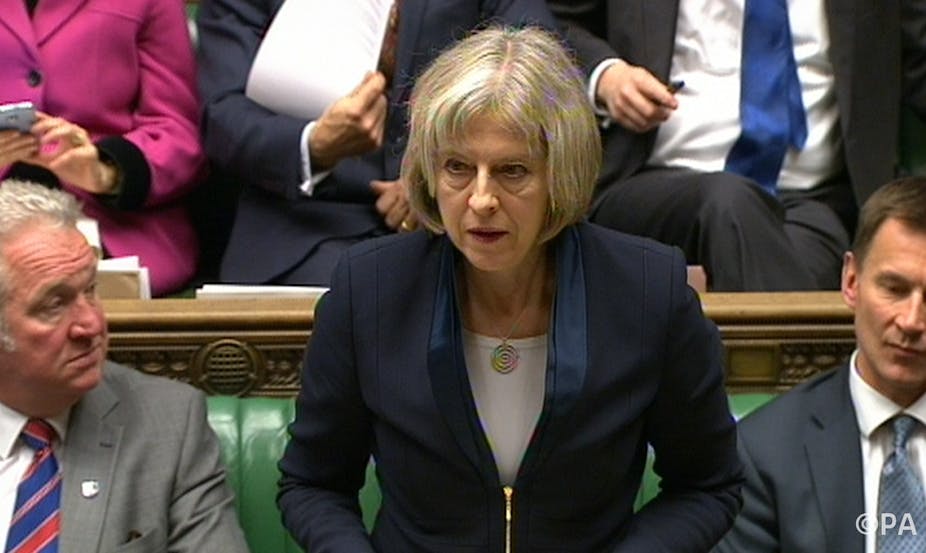The home secretary, Theresa May, has announced a series of major developments in the beleaguered and faltering historical child abuse inquiry – the investigation into claims that political figures, and others from a range of institutional backgrounds, sexually abused children and had their crimes covered up.
This inquiry has been beset with problems ever since it was set up in July 2014. Two successive heads of the inquiry, Baroness Elizabeth Butler-Sloss and Dame Fiona Woolf, stood down following concerns over their suitability; there have been criticisms over the inquiry’s powers and remit, as well as claims of bullying involving panel members.
Central to May’s announcement is the appointment of a new inquiry head, Justice Lowell Goddard, a judge of the High Court of New Zealand.
The appointment of Justice Goddard seems an astute, if not inspired, decision. She led an inquiry into police handling of child abuse in New Zealand; was chairperson of the country’s Independent Police Conduct Authority; contributed to setting up the HELP Clinic, for sexual abuse victims; and was an independent expert to the UN Subcommittee on Prevention of Torture.
Last but not least, she is presumably quite far removed from the UK political and legal establishment and consequently brings with her a neutrality that the inquiry desperately needs.
But besides Goddard’s appointment, May revealed a number of other crucial changes to the inquiry’s structure and strength.
Starting from scratch
The existing inquiry, and its membership, is to be scrapped. It will be replaced by a body named the Independent Panel Inquiry into Child Sexual Abuse (IPICSA) and a new membership.
The new inquiry will have statutory powers under the 2005 Inquiries Act giving it more powers, meaning it will have the ability to compel witnesses to attend and give evidence – including, importantly, documentary evidence. It will also be able to look at concerns prior to the 1970s.
The previous inquiry had become a debacle, and had managed to simultaneously become both ominous and ludicrous; scrapping it was the right decision. But one of its most fundamental flaws has nonetheless been carried over into the IPICSA.

May’s decision to set up this inquiry was brought about, in large measure, by pressure from a small number of MPs and other concerned groups who were, and are, alleging that political figures sexually abused children and were then able to avoid being brought to justice through the actions of the police (including Special Branch) and the Security Service, MI5.
Yet when setting up the original inquiry, May declared that its terms of reference were to be far wider than had been anticipated or called for. A whole swath of “public bodies and other non-state institutions” are now expected to feature in the inquiry, including the BBC, the NHS, the Church of England and assorted local authorities.
May reinforced this theme in her statement on February 4. Referring to supposed local authority child abuse scandals, she said: “What we have seen so far in Rotherham, Oxford, Greater Manchester and elsewhere is only the tip of the iceberg.”
But most, if not all, of these bodies have already been quite thoroughly scrutinised over their handling, or mishandling, of child abuse cases. By leaving them in the inquiry’s remit, May has in one stroke given the inquiry a great deal of unnecessary work and made it almost impossibly unwieldy. It has almost been set up to fail or at a minimum to dilute much of the criticism that might otherwise be directed at political abusers and their protectors and enablers.
Fundamental corruption
Since May first announced that an inquiry would be held, there has been an almost unending series of allegations that political figures have themselves sexually abused children and subsequently had their crimes hidden with the collusion of the police, Special Branch and/or MI5.
These include the cases of various deceased establishment luminaries: Sir Peter Hayman, a senior diplomat and “intelligence operative”; Sir Peter Morrison, MP for Chester and parliamentary private secretary to Margaret Thatcher; and of course, Rochdale MP Cyril Smith.
In some respects, what lies beneath these allegations is even more serious than concerns of child sexual abuse. There is an ever-growing suspicion that the political, criminal justice and security systems in this country may be fundamentally corrupt. If this is the case, then it is not only children but the whole of the UK’s citizenry who are theoretically vulnerable to abuses of power on a scale we have so far preferred not to imagine.
Whether the reformed, reconstituted IPICSA will be able to break into this alleged netherworld remains to be seen. I for one sincerely hope it will – but the odds are not in its favour.

